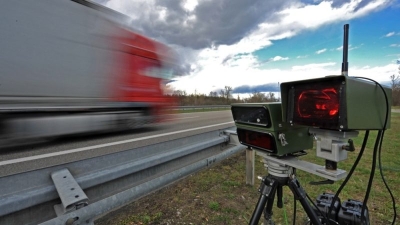Energy Taxation Directive: Europe’s key climate law stuck in a quagmire

Talks to revise the 20-year-old Energy Taxation Directive are moving at a snail’s pace amid resistance from EU countries in a matter that requires unanimity among the 27.
At the turn of the century, European Union countries realised that while they had imposed minimum taxation rates on oil products, other sources of energy were not subject to similar duties.
This endangered the proper functioning of the EU’s single market, they concurred, and the Energy Taxation Directive (ETD) was adopted in 2003.
The directive set out minimum tax levels on all types of energy, ranging from transport and heating fuels to electricity. Thanks to the directive, EU countries could no longer engage in price dumping to undercut each other and the single market was preserved.
But the law, which taxes fuels based on their energy content per volume – or euros per litre – is no longer fit for purpose as Europe aims to reach climate neutrality by 2050.
Moreover, numerous exemptions were added – for aviation or maritime fuels used in fishing boats.
To address this, the European Commission tabled a revision in July 2021 as part of its ‘Fit for 55’ plan aiming to halve greenhouse gas emissions by the end of the decade.
Instead of a volume, “fuels will start being taxed according to their energy content and environmental performance,” the EU executive announced at the time.
“Fuels that have the most negative impact on the environment will be subject to higher minimum rates,” the proposal envisioned. And those used for “intra-EU air transport, maritime transport, and fishing should no longer be fully exempt from energy taxation,” it added.
In a nutshell, the proposal would “remove outdated exemptions and reduced rates that currently encourage the use of fossil fuels,” an EU official told EURACTIV.

EU energy tax plan seeks to end ‘hidden advantage’ for fossil fuels
A proposed new EU-wide fuel taxation system based on energy content rather than volume seeks to end incentives for petrol and diesel, aiming instead to support the uptake of green biofuels, renewable hydrogen and synthetic fuels.
Unanimity: the main roadblock
However, getting rid of these decades-old privileges has proved unpopular among EU countries, making the necessary unanimity nearly impossible to reach in the EU Council of Ministers, which brings together the bloc’s 27 member states.
Yet, the law is seen as a key aspect of the bloc’s climate policy because it favours electricity over fossil fuels.
“All studies suggest that electrification – up to 60-70% of the economy – is the cheapest solution to achieve Europe’s carbon reduction objectives. Yet at the same time, we put very high taxes and levies on the electricity sector, which brings up power prices,” explained Christian Egenhofer, a senior research fellow at the Centre for European Policy Studies in Brussels.
“The only way you can deal with this is to reduce taxation on electricity and raise taxes on high carbon fuels and products,” he told EURACTIV in an interview in July 2019, before the current European Commission took office.
Research by the Regulatory Assistance Project, a green policy think-tank, found that in large EU countries, electricity bore a disproportionate share of the energy taxation burden. In Italy, Spain, the UK, Belgium, and Germany, “electricity is overtaxed, in three cases by more than 200%, and oil and fossil gas are undertaxed,” the think-tank found.
Can the Energy Taxation Directive (ETD) fix this taxation mismatch?
A rocky road
While many of the Commission’s climate policy proposals from 2021 are either adopted or in the final stages of negotiation, talks on the ETD are progressing at a snail’s pace.
On 11 May, a working group of EU countries met to discuss the minimum tax rates that should be enshrined in the new ETD, the first meeting of its kind since the reform was launched almost two years ago.
Until then, discussions had focused entirely on the “taxable basis,” a first agreement on what will be covered by the rules.
But that was the easy part. Establishing a consensus on minimum tax rates is “a difficult and politically sensitive topic,” explained a spokesperson for the Czech permanent representation in Brussels, which led negotiations on the ETD during its six-month stint at the EU helm last year.
The Swedes, who hold the EU’s rotating presidency until July, have no real hope of finding an agreement on the ETD during their six-month stint. “Sweden does not expect an agreement during our presidency. Hence, the file will be handed over to the Spanish presidency,” a spokesperson said.
According to the Czechs, further work is still needed, “particularly with regard to EU minimum levels of taxation and the length of transitional periods”. EU countries are asking for longer transitional periods in sectors where sensitive exemptions are being abolished.
Spain, which will take the EU presidency baton from the Swedes, declined to comment on the record. But their successor, Belgium, expects having to deal with ETD negotiations too in 2024.
“A review of the Energy Taxation Directive is under way,” noted an initial programme of the Belgian EU presidency, seen by EURACTIV. “The presidency will continue discussions in the Council,” it added.
A long, arduous journey seems to be ahead for the Brussels diplomats, who must navigate 27 different sets of interests to clinch a deal. Here are the biggest sticking points.
The highest hurdles
Maritime shipping is one of the sectors whose generous exemptions could be abolished by the directive. Industry insiders call this a double whammy, given that the sector is also set to be included in the EU’s carbon trading scheme.
Greece, Malta, and Cyprus, the ports of choice for global shipping companies and insurers, are staunchly opposed to abolishing the exemption.
Other countries, particularly those with dominant fishing industries, are fighting to keep alive the tax break on fishing fuel, largely diesel. They “claim to defend the competitiveness of their fishing industry,” said Davide Sabbadin, a senior climate policy officer at the European Environmental Bureau (EEB), a green umbrella group.
Spain and Portugal traditionally team up to defend the fishing industry’s interests in Brussels, at times with backing from Paris. Other EU countries like Ireland and Denmark can also be relied on to defend the interests of the fishing industry.
Abolishing the EU’s special treatment for aviation fuels is causing some discontent as well.
“Taxation of aviation and shipping currently seems rather tricky for most southern European countries,” explained Henrike Hahn, a green EU lawmaker from Germany.
Meanwhile, recalibrating the taxes on road transport fuels – diesel and petrol – as well as a reorientation of coal taxes, are proving unpopular in Central and Eastern Europe. Some 46% of Poles heat their home with coal, and a revised ETD would see the minimum tax on coal for heat increase.
“In Central and Eastern Europe, the ETD faces greater resistance overall,” said Hahn. Completing the reform before the 2024 EU elections appears out of reach, she added.

Fair fuel pricing: A test for Europe’s climate ambitions
Is the EU committed enough to increase taxes on fossil fuels? That is a question that needs to be raised now considering the long-running debate on the best measures, including energy taxation, to reduce greenhouse gas emissions, write Kai Schlegelmilch and Zoltán Szabó.
Read more with EURACTIV




